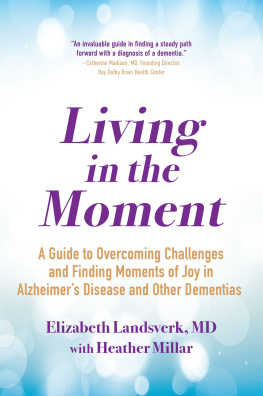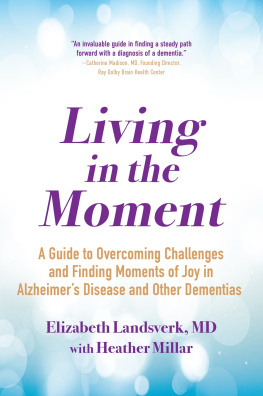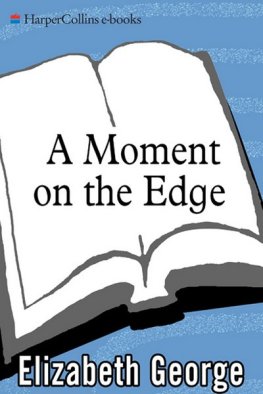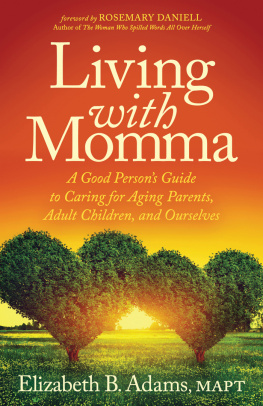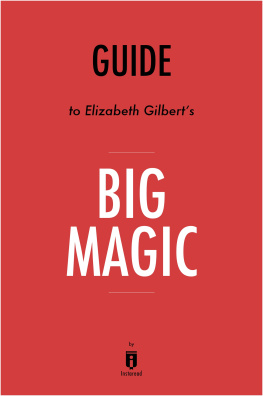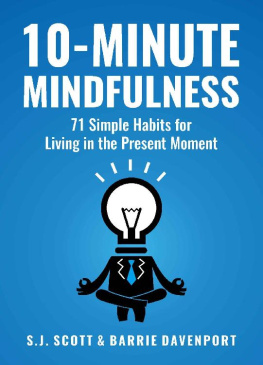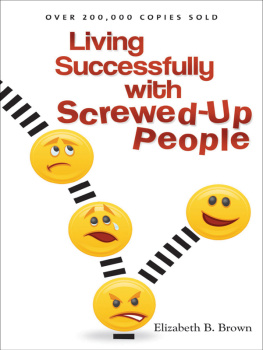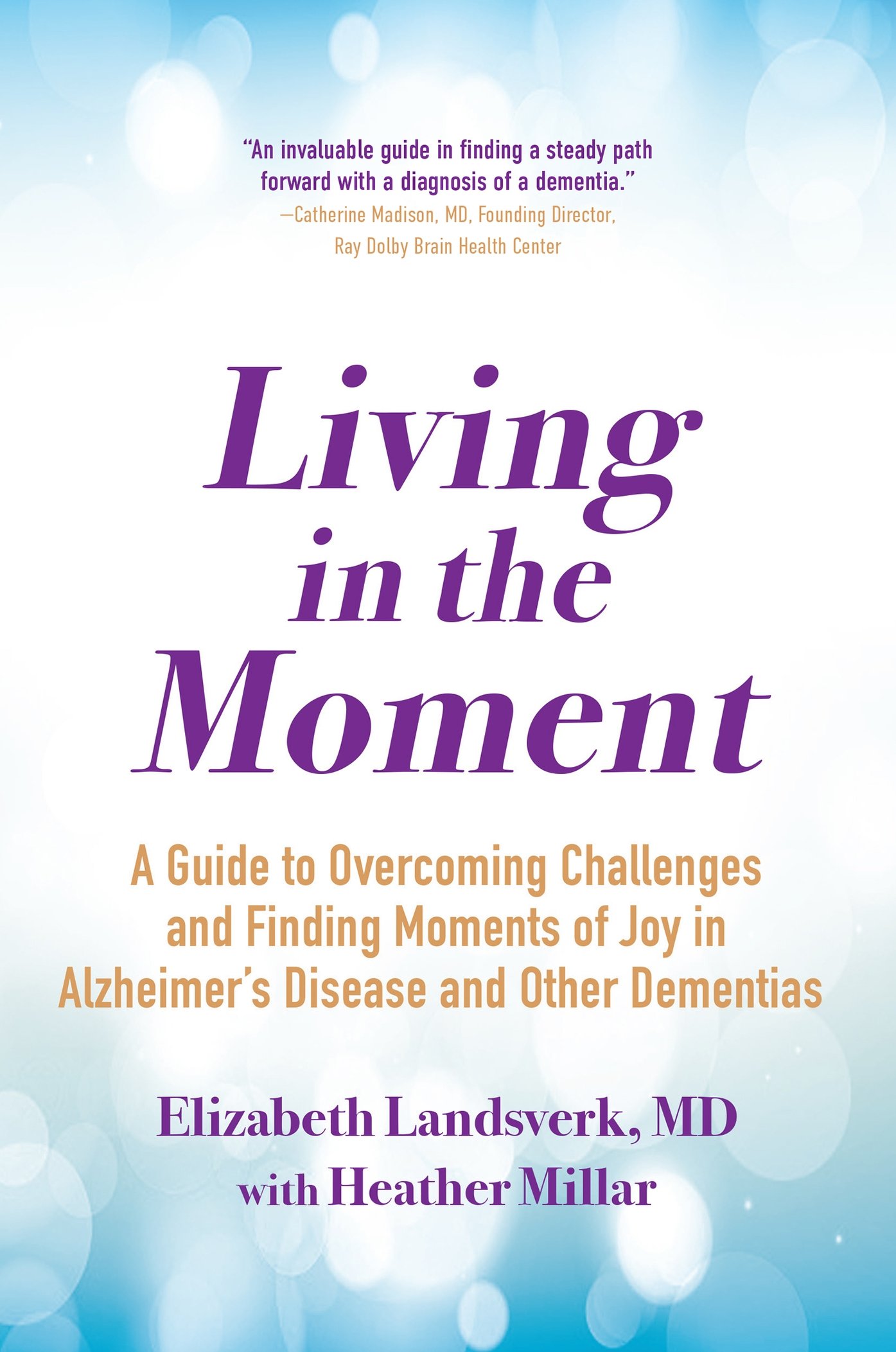
Praise for Living in the Moment
Dr. Landsverk makes navigating the medical and behavioral challenges for a loved one with dementia a bit easier to comprehend. The book explains what is happening, what is likely to happen, and how to do the right thing along the way. Recommended to family members who suspect their loved one might have dementia, essential to those with new diagnosis and no where to turn, validating and reassuring those who are already on the dementia journey with a loved one.
KJ Page , Gerontology RN, ED, Joint Commission Nursing Center Policy
A valuable resource... [this] book is essential for understanding a confusing disease and navigating the medical, legal, and financial challenges for these vulnerable elders. Everyone needs this book.
Kim Schwarz , CLPF, past president, Professional Fiduciary Association
Dr. Landsverk reveals the secrets to medical and personal care with people with dementia. Her insights tell you what to expect and how to fix things so people with dementiaand their loved onescan live their best lives.
Marsha L. Keeffer , CLPF, partner, Practical Heart Fiduciary Services
Dr Landsverk has shared a geriatricians perspective to provide poignant yet practical insight with an exceptional level experience, to equip families for the journey ahead of them.
Nancy Schier Anzelmo MSG, gerontologist, advisor to Alzheimers Association and Dementia Action Alliance, founder Connected Horse
Provides lots of practical advice and information on a medical condition that remains a source of confusion for many families and doctors alike.
Carlos A. Camargo, Jr. , MD, professor of emergency medicine, Harvard Medical School, professor of epidemiology, Harvard School of Public Health
Dr Landsverks unique blend of intellectual competence and curiosity makes her an invaluable guide in finding a steady path forward with a diagnosis of a dementia. Her greatest interest is in identifying causes of distress and agitation to help elders better enjoy their lives. She works to treat unrecognized pain while improving the overall medication regimen.
Catherine Madison MD, founding director, Ray Dolby Brain Health Center
Living in the Moment
Overcoming Challenges
and Finding Moments of Joy in
Alzheimers Disease and Other Dementias
Elizabeth Landsverk, MD with Heather Millar
CITADEL PRESS
Kensington Publishing Corp.
www.kensingtonbooks.com
All copyrighted material within is Attributor Protected.
CITADEL PRESS BOOKS are published by
Kensington Publishing Corp.
119 West 40th Street
New York, NY 10018
Copyright 2022 Elizabeth Landsverk
All rights reserved. No part of this book may be reproduced in any form or by any means without the prior written consent of the publisher, excepting brief quotes used in reviews.
PUBLISHERS NOTE
This book is sold to readers with the understanding that while the publisher aims to inform, enlighten, and provide accurate general information regarding the subject matter covered, the publisher is not engaged in providing medical, psychological, financial, legal, or other professional services. If the reader needs or wants professional advice or assistance, the services of an appropriate professional should be sought. Case studies featured in this book are composites based on the authors years of practice and do not reflect the experiences of any individual person.
CITADEL PRESS and the Citadel logo are Reg. U.S. Pat. & TM Off.
ISBN: 978-0-8065-4177-8
First Citadel trade paperback printing: June 2022
Electronic edition:
ISBN-13: 978-0-8065-4178-5 (e-book)
To my elders, who have taught me more than medical school ever did.
Introduction
N O AFFLICTION OF OLD AGE is more likely to be treated ineffectively than dementia. The onset of dementia is gradual, complicated, and subtle. Successfully addressing medical and behavioral needs requires finesse. Sadly, too often, the effort is unsuccessful.
I know about this firsthand. After graduating from the University of Virginia Medical School and completing a residency at Harvard, I worked as a primary care physician for seven years. One day, an older man came into my clinic complaining of chest pain. I tried to do an electrocardiogram to check his heart, but the man started hitting everyone within reach. He was out of control. I had to ask the staff members to take him away. It bothered me that I didnt know what to do.
The incident inspired me to do a fellowship in geriatricsmedicine for eldersat Mount Sinai Medical Center in New York City, one of the worlds leading centers for research on treating people as they age. I focused on the mental health problems of old age. After finishing my specialty training in geriatrics, I became an assistant clinical professor at the University of California at San Francisco (UCSF). But while UCSF is one of the top ten medical research centers in the country, I found that academic medicine didnt suit me, that clinical care was my passion. I wanted to have more freedom to direct that care and more opportunity to teach the techniques that I had learned at Mount Sinai. Now I knew how to handle an elder who becomes uncontrollably violent at the prospect of a routine test. Even more important, I knew how to prevent the outburst in the first place.
I left UCSF fourteen years ago to form my own independent practice, ElderConsult Geriatric Medicine, specializing in house calls for older patients. I also served as medical director of a hospice providing end-of-life care. Education and outreach had become increasingly important to me. Doctors usually give talks to other doctors. I wanted to spread awareness in the community, to let lay people know about alternative ways of treating the mental health problems of old age, especially agitation, depression, and psychosis. I advocate using sedating drugs as little as possible. I emphasize behavior modification and lifestyle changes.
As a society, we tend to both undermedicate and overmedicate: giving too many tranquilizers to some patients while not addressing the pain or disruptive and irrational behavior of others. We are loath to take decision-making power from our elders, and we have imperfect tools to measure whether a person has capacitythe ability to run his or her own affairs.
The result is that many elders with early dementia suffer some kind of psychological, physical, or financial abuse. Then, when we do step in to manage our elders lives, some of us take too much power, forgetting to allow them the freedom to choose what they eat, what they do, or whether they want to have a romantic partner.
Even more commonly, dementia treatment is nonexistent: Only one in five of those with symptoms of dementia have been diagnosed, according to testimony before the United States Senate.
Even when theyre on the case, families, caregivers, and health professionals often find it difficult to assemble all the necessary information or resources to address the complete picture. Families may exhaust themselvesboth physically and financiallycaring for a demented relative, unaware of the many kinds of support available. Caregivers may grow frustrated, unaware that very simple adjustments to daily routines can sometimes make all the difference for a dementia patient.





